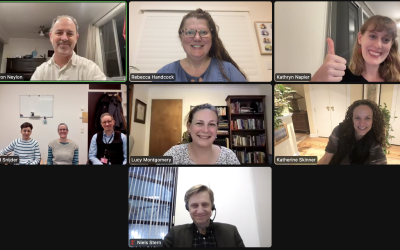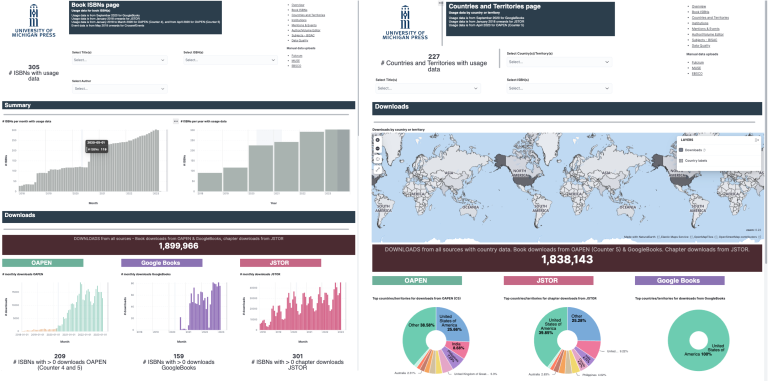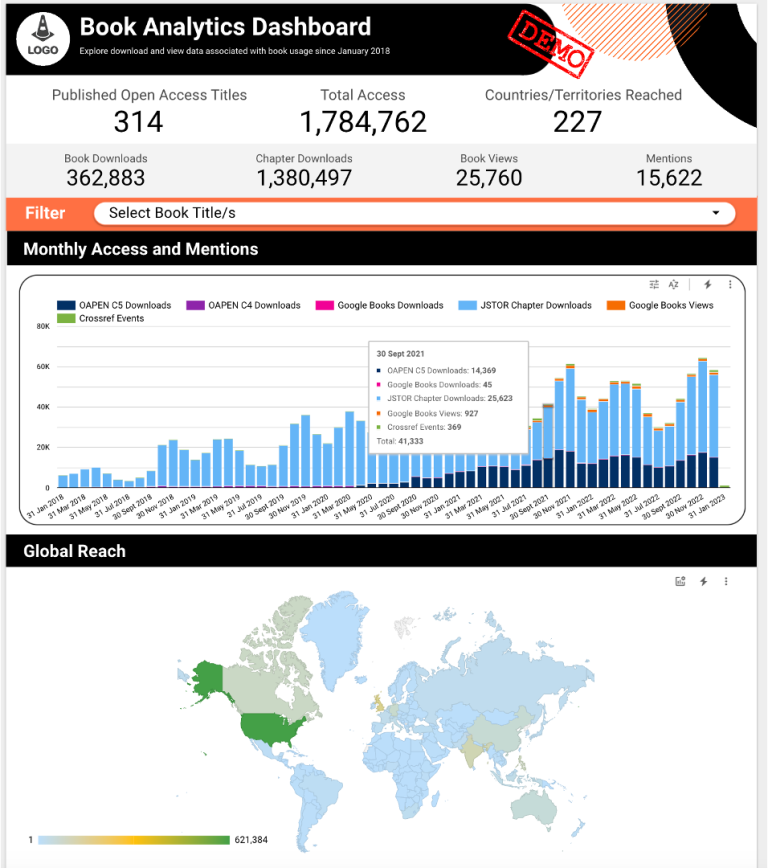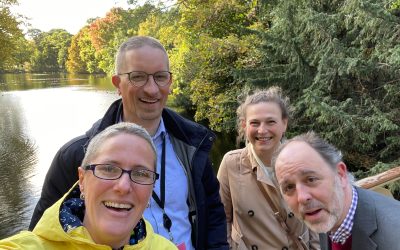Kathryn Napier, BAD project Technical Lead, Curtin Open Knowledge Initiative (COKI), Curtin University
The Book Analytics Dashboard (BAD) project (2022-2025) is a 3-year, Mellon Foundation funded project that is creating a sustainable analytics service to support diverse Open Access (OA) book publishers. Affectionately referred to as the BAD project, our goal is to provide publishers with user-friendly tools to navigate complex data about how their books are being used. The project is grounded in the premise that efficient, user-friendly usage analytics services are needed to safeguard and support diversity in the voices, perspectives, geographies, topics, and languages made visible through OA books.
The BAD project is building on the earlier (2020-2022) Mellon-funded Developing a Pilot Data Trust for Open Access Ebook Usage project, affectionately referred to as the OAeBU project. The BAD project is scaling workflows, infrastructure and customer support processes originally developed during the earlier project. In addition to technical refinement and scaling, BAD is developing a long-term plan for housing, maintenance, and funding of the analytics service as a sustainable community infrastructure.
The team working on BAD is truly international. The Principal Investigator (PI) team comprises: Lucy Montgomery from Curtin University (Australia); Cameron Neylon (Curtin University); Niels Stern and Ronald Snijder (OAPEN Foundation, the Netherlands), as well as community cultivation expert Katherine Skinner (Research Lead at IOI, based in the United States).
I lead the project’s technical team, which is based at Curtin University and has close links to the Curtin Institute for Computation. The Curtin team is working closely with OAPEN to support the development of the governance and sustainability model needed to ensure the long-term stability of a dashboarding service. The whole project team meets weekly, coordinating a series of teleconference meetings and coworking sessions across hemispheres and timezones.

Cameron Neylon (Curtin University), Rebecca Handcock (Curtin University), Kathryn Napier (Curtin University), Sînziana Păltineanu (OAPEN Foundation), Laura J. Wilkinson (OAPEN Foundation), Ronald Snijder (OAPEN Foundation), Lucy Montgomery (Curtin University), Katherine Skinner (Formerly Educopia Institute, now IOI), Niels Stern (OAPEN Foundation) meeting online in March 2023.
Consult, listen, iterate
Engaging with community feedback productively has demanded willingness, not just to consult stakeholders, but also to listen and iterate technical directions. The decision to move away from Elasticsearch Kibana in favour of Looker Studio during the first year of the project is an example of how this process of consulting, listening, and iterating has worked in practice.
In 2022, when the BAD project kicked off, an important first priority was community consultation and the development of the first annual Technical Roadmap. A draft technical roadmap was made available for community comment and feedback in June-July 2022. The draft technical roadmap had a dual purpose: making technical systems and plans visible to stakeholders; and inviting those stakeholders into a conversation about where effort and resources should be focussed.
The original project plan placed a heavy focus on standardising technical workflows developed during the previous OAeBU project, in order to support scaling of a dashboard service. This included the use of ElasticSearch Kibana, a system chosen because of its ability to allow for fine-grained user access roles and permissions, and well suited to keeping the information contained in dashboards private. However, ElasticSearch Kibana is less well-suited to a publisher-focussed dashboard service that engages with the value of dashboards to support advocacy and public communication. Being able to easily make dashboards public, embedding dashboards within publisher websites, and simple, visually appealing user interfaces required a different solution.

An example of pilot dashboards produced using ElasticSearch/Kibana during the OAeBU project.
Community consultation and feedback in the early stages of the BAD project highlighted important differences between the primary use cases imagined during the OAeBU project, which focussed on keeping data private; and the needs of users focussed on external messaging and public sharing of visualisations. Improving user experience needed to become a higher priority. Rather than simply standardising ElasticSearch Kibana workflows, the BAD dashboards needed both a visual and technical revamp. Technical work shifted focus to producing dashboards that can be used both publicly for marketing and communication and internally for reporting by publishers.

An example of the BAD dashboards produced using Looker Studio during the first year of the BAD project (see the template dashboard here, and the University of Michigan Press’ dashboard embedded in their website here).
We therefore shifted our focus on technical priorities in the updated technical roadmap (released in January 2023) to investigating alternative dashboarding solutions, and produced a template dashboard using Looker Studio, a dashboarding solution offered by Google. This template dashboard formed the basis of focus group community consultations that took place in the first quarter of 2023, and the dashboard design will continue to iterate and incorporate feedback through the life of the BAD project.
Virtual, in-person, hybrid: working as a truly global team
The first year of the BAD project presented both challenges and exciting opportunities. Coordinating project management and deliverables across a multinational and multidisciplinary team is not a simple exercise, and we have discovered that a combination of detailed in-person meetings and workshops with regular teleconference meetings has resulted in the best outcomes for the project. The lightbulb moment that occurred in late 2022 where we shifted our technical priorities and dashboarding system would not have occurred without a series of in-person meetings.

Laura J. Wilkinson (OAPEN Foundation), Ronald Snijder (OAPEN Foundation), Lucy Montgomery (Curtin University) and Cameron Neylon (Curtin University) meeting in person for a series of project workshops in The Hague, October 2022.
This shift in technical focus came at an ideal time within the first year of the project. We are now well placed to further refine the dashboard design through the feedback received from the focus groups (detailed in the draft technical roadmap for year 2), which will also inform the continued development of the dashboarding services sustainability, governance and financial models. We will continue to endeavour to build the best service we can with the combined talents from our multidisciplinary team.
Learn more about the BAD project
- Visit the BAD project website
- Follow the BAD project on Twitter @BookAnalytics
- Join the BAD project mailing list
- Visit the BAD project Zenodo community
- See the BAD dashboard for University of Michigan Press
- Our book-focussed GitHub repository
- Our technical documentation on Read the Docs
- Email BAD [email protected]


Recent Comments